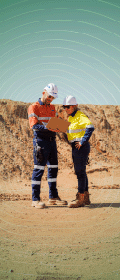Employing precision surface mining at African bauxite mine
The Boké Mine in Guinea, Africa, holds some of the world’s highest-quality bauxite deposits. To efficiently extract, process and transport the material from the mine, located approximately 30 km (18.6 miles) from the northern shores of the Rio Nuñez in Boké Prefecture, the Société Minière de Boké mining company (SMB) was formed in 2014. Today, SMB is one of the fastest growing members of the Guinean economic mining landscape. SMB was established through a strategic alliance between Winning Shipping Ltd, UMS International Ltd, Shandong Weiqiao and the State of Guinea.
Optimising operations
Committed to optimising their operations, the consortium started looking into alternative mining methods a few years ago. During the process, the group’s members visited a surface mine in Australia to learn about precision surface mining methods. On site, the team got its first look at the Vermeer T1255III Terrain Leveler® surface excavation machine (SEM).

“We had several questions about the efficiency of surface excavation equipment,” Rui Shiliang, Executive Personal Assistant to the President of the Winning International Group, recalled. “It was clear that using a machine like the Terrain Leveler SEM could help us reduce our labour costs, but we needed to determine what the overall cost comparison would be for an operation like ours.”
In addition to visiting with several other mining operations and SEMs for road construction, SMB invited the team from the Vermeer West Africa dealership to come out for a visit.
While there, the group gathered rock samples to ship back to the Vermeer Rock Lab located at the manufacturer’s headquarters in Pella, Iowa, USA. The experts at the lab conducted unconfined compressive strength, indirect tension, abrasivity, density and energy index testing
to help determine how the material would respond when being cut. Based on that information, the local dealer helped SMB estimate production and service expenses associated with using the Vermeer Terrain Leveler SEM.While there, the group gathered rock samples to ship back to the Vermeer Rock Lab located at the manufacturer’s headquarters in Pella, Iowa, USA. The experts at the lab conducted unconfined compressive strength, indirect tension, abrasivity, density and energy index testing to help determine how the material would respond when being cut. Based on that information, the local dealer helped SMB estimate production and service expenses associated with using the Vermeer Terrain Leveler SEM.
Impressed with the results of the testing, associated production and cost estimates and the responsiveness they received from their Vermeer dealer, the SMB group decided to give precision surface mining a try.
Side-by-side comparison
SMB invested in two Vermeer Terrain Leveler SEMs for the mine and made arrangements to run the machines in conjunction with its drilling and blasting methods. The mine was divided into two areas so the team could get a side-by-side comparison.
“Drilling usually occurs a week ahead of blasting and involves several drilling machines to produce a 5-m x 5-m (16-ft x 16-ft) grid of boreholes,” Shiliang explained. “Around a week after the drilling process is complete, we’ll then come through and blast. Around 50,000-100,000 t of bauxite is extracted each time. The material produced ranges in size, so additional screening and crushing is necessary, which can certainly have a major impact on our operational costs.”
SMB found precision surface mining methods to be much more straightforward, with less preparation time and fewer steps involved. Using top-down cutting, the Terrain Leveler SEM is able to work the ground layer by layer, while producing consistently sized product that does not typically require additional screening or crushing. Smaller-size product justifies the use of regular trucks over high-weight/high-cost mining trucks and can be more cost efficient.
In addition, the Vermeer Terrain Leveler SEM offers manoeuvrability, which allows the operator to surface mine more selectively in small areas and perform on slopes up to 20°. And, according to Shiliang, the SMB consortium has been impressed with this new way of surface mining. “Overall, using the Terrain Leveler SEM machines is more cost efficient than drilling and blasting for our operation,” he explained. “We are saving on labour expenses and have been able to reduce the number of times that material has to be handled.”
Shiliang also noted that loading trucks in the cut has been more efficient since the Terrain Leveler SEM surface-mined surface area is much smoother. “We spend less time preparing and maintaining haul roads, manoeuvring trucks in and out of the cut, and there is significantly less damage to tyres,” he said.
Making the cut
In the first year of operating two Vermeer Terrain Leveler SEM machines at the Boké mine, SMB estimated each unit produced around 2.75 million tonnes per annum of ore with a mechanical availability in the range of 90-92°. Those totals have continued to rise each year after.











